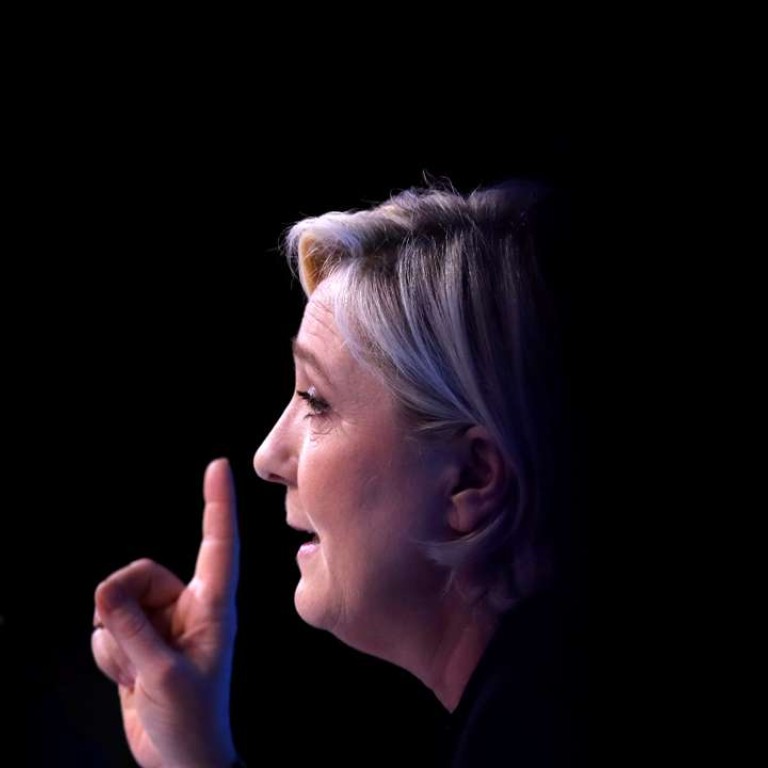
Don’t be fooled by the euro’s recovery: populist politics is on the rise
Investors are under the false impression that a rising tide of anti-establishment politics that engulfed the US and Britain may spare the euro zone
On Tuesday, the euro shot up by 0.7 per cent versus the dollar to reach its highest level since November, bringing its gains against the greenback since the beginning of this month to 2.7 per cent.
For a currency which has suffered because of concerns about an escalation in political risk in Europe’s single currency area - and which lost 2.3 per cent against the dollar last month due to fears about the possibility of far-right leader Marine Le Pen winning the decisive round of France’s presidential election on May 7 - this is quite a rally.
There are several reasons why the euro has been strengthening of late. One of them is increasing confidence among international investors that the rising tide of anti-establishment populism that engulfed the US and Britain last year may spare the euro zone.

Indeed, Le Pen’s main opponent, the independent and reform-minded candidate Emmanuel Macron, performed well in a presidential TV debate on Monday, cementing his status as the frontrunner in the election and boosting sentiment towards the euro.
In a sign of the extent to which investors viewed the more market-friendly result of the Dutch election through the prism of France’s high-stakes presidential contest, the spread between the yields on benchmark French and German 10-year government bonds - the most closely watched measure of perceived political risk in France - narrowed immediately after the results of the Dutch ballot were published and now stands at 64 basis points, compared with 85 basis points a month or so ago.

Yet has populism really peaked in advanced economies, and is this a reason to take a more bullish view on the euro?
Firstly, it is noteworthy that the main reason why Wilders’ party did not perform as strongly in the Dutch election as markets had feared is because the main centrist parties, in particular Dutch premier Mark Rutte’s centre-right group, co-opted parts of Wilders’ nationalist and populist agenda during the campaign.
The recent strength in the euro is, paradoxically, a reflection of mounting concerns about the consequences of populism in the US
The Dutch political landscape has, if anything, become even more populist since the election.
Secondly, as Deutsche Bank rightly notes, “there are limited takeaways for the French presidential race.” There is a huge difference between a Dutch parliamentary election based on proportional representation and a highly personalised two-horse race in the French presidential run-off.
Make no mistake, Le Pen, a charismatic and consummate politician, should not be written off.
Thirdly, the euro has strengthened mainly because the dollar has fallen sharply since last Wednesday’s decision by the US Federal Reserve to refrain from announcing a faster pace of interest rate rises. The dollar index, a gauge of the greenback’s performance against a basket of its peers, has fallen 1.8 per cent since March 15, buoying other currencies, including the euro.

For the first time since Trump was elected president in November, investors are seriously questioning the political underpinnings of ‘Trumponomics’.
The recent strength in the euro is, paradoxically, a reflection of mounting concerns about the consequences of populism in the US.
Even in Europe, while the far right did not perform as strongly as expected in the Dutch election, anti-establishment sentiment in the European Union – fuelled by the Brexit vote – has forced the European Commission to shelve plans for further economic and political integration within the bloc, possibly indefinitely, given growing antipathy towards the euro zone on the part of populist and nationalist parties.
Even if Le Pen loses France’s presidential election – which is still likely – centrist parties in many European economies are likely to turn more populist in order to attract votes, as was the case in the Netherlands.
The populist tide has yet to turn.
Nicholas Spiro is a partner at Lauressa Advisory

